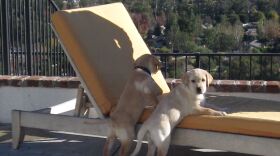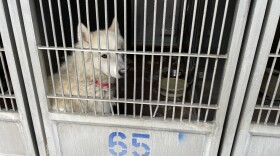-
Carlos, who served in the Marines as a leader, teaching fellow Leathernecks the tools they’d need to survive in the war zone, decided to become a full-time trainer at Freedom Dogs, teaching Marines with PTSD how to survive their war wounds.
-
When Carlos first started attending training sessions at Freedom Dogs, he felt he didn’t fit in. Big reason: Carlos was afraid of dogs. He didn’t like them, and he believed they didn’t like him. In the tough, gang-infested Chicago streets where Carlos grew up, dogs were treated more as weapons than pets.
-
A critical care nurse and veteran’s daughter named Meribeth Russell started Freedom Dogs in 2006. Russell got the idea when she participated in a hospital study that found obese children who were able to bond with a therapy dog had an easier time losing weight.
-
In the days following the suicide car bombing in 2004, Carlos didn’t feel angry. He didn’t feel frightened. He didn’t even mourn the men who were so brutally killed that day. Carlos didn’t feel anything at all. He was completely numb.
-
There was a shyness about Carlos, despite his intimidating appearance. Muscles earned from years of required physical fitness bulged under his black shirt, his sleeves pushed up to his elbows to reveal a maze of tattoos covering both of his forearms.
-
I first met Carlos Cruz in 2012, two weeks after he officially retired from the Marine Corps. It took quite a few email exchanges to nail down the time and day of our meeting. One of the most marked symptoms of the Traumatic Brain Injury Carlos suffered in the suicide attack is his inability to remember small details.
-
The force of the explosion knocked Carlos unconscious. When he came to, he had momentarily lost his hearing. The chaotic world before him was silent, but the facial contortions of the Marines who had survived told him that they were screaming in horror.
-
Carlos Cruz was part of a three-vehicle convoy patrolling the scorching, silent Iraqi desert. Carlos, a Marine lance corporal at the time, was in the rear of the convoy, lying down in the back seat of a Humvee. The only protection he had from outside attack was a Kevlar blanket covering his body, and sandbags pushed against the window. The Humvee itself had no armor.
-
Dogs are helping troops coming home from war through their darkest days. Home Post's multi-day series called "Even the Devil Can't Fool a Dog" will focus on how a Yellow Labrador Retriever named Logan is helping Camp Pendleton Marine Corps veteran Carlos Cruz battle post-traumatic stress disorder.
-
Time is running out to enter Dogs on Deployment's "2015 Military Pet of the Year" contest. Dogs on Deployment is a non-profit group that helps find temporary homes for the beloved canines (and kitties) of troops during their deployments.
RELATED STORIES
-
-
-
-
-
-
-
KPBS Midday Edition
-
-
Sign up for our newsletters!
Keep up with all the latest news, arts and culture, and TV highlights from KPBS.
- San Diego proposes keeping low-density housing near Clairemont trolley stops
- San Diego Zoo mural honors 3 beloved animals lost in 1 week
- Buried audit found major problems at San Diego County animal shelters. Issues still persist
- Activists want state commission to consider decertifying SDPD chief
- Hundreds still without power in the Imperial Valley after Monday's monsoon storms























